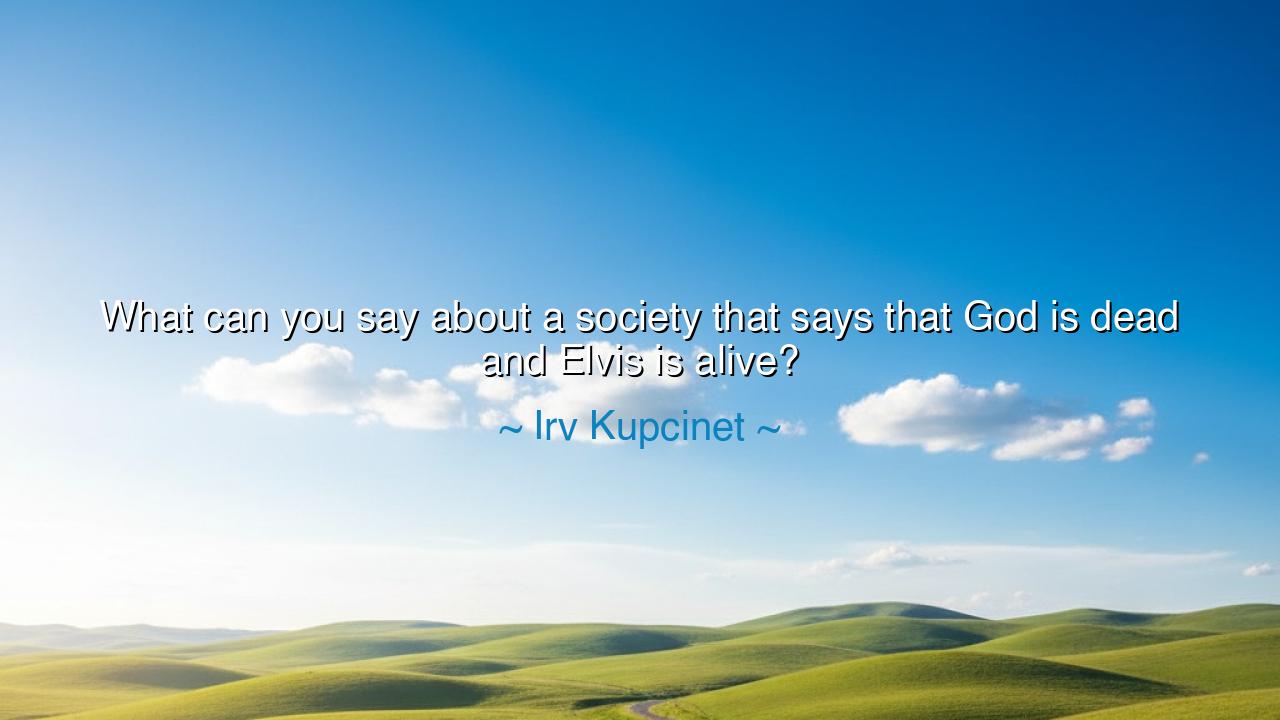
What can you say about a society that says that God is dead and






In the swirling currents of human history, there have been moments when the foundations of society and its values seemed to crumble, moments when the sacred and the mundane collided with such force that it shook the very understanding of what it means to be human. The words of Irv Kupcinet—"What can you say about a society that says that God is dead and Elvis is alive?"—echo with the resonance of this crisis. They are a poignant reflection on the state of a world that has, in many ways, redefined its values and priorities, leaving behind the timeless truths of the past in favor of the fleeting idols of the present.
At the core of Kupcinet's words lies a lamentation for a society that has seemingly lost its way. To say that God is dead is to speak of the spiritual death of a civilization—a civilization that once revered the divine, placed faith in moral principles, and sought purpose in the search for truth and meaning. But when God is removed from the equation, the sacred is discarded, and what remains is a world devoid of higher purpose—a world where materialism, instant gratification, and superficial fame take center stage. In this world, the soul is left to wander, searching for meaning in the wrong places.
Then comes the ironic twist—Elvis is alive. The king of rock and roll, who has passed from this world, is made a symbol of the idolatry of our times. What does it mean that in a society where God is dead, a pop star—someone who represents the fleeting nature of fame and superficial success—is elevated to such a status? Elvis, a figure who rose to stardom not through the pursuit of virtue but through entertainment and performance, becomes a symbol of what has come to replace the divine. The culture has shifted from one that once revered the sacred to one that celebrates the temporary, the glamorous, and the imperfect.
This paradox is not without historical precedent. The Roman Empire, in its decline, witnessed the rise of decadence and idolatry, where the grandeur of its emperors and the excesses of its elite replaced the spiritual and moral values that had once guided Roman society. The decline of spiritual faith in Rome, much like in Kupcinet’s reflection, was followed by a rise in materialism and a focus on worldly power and pleasure. In their search for meaning, the Romans turned to the entertainment of the gladiatorial games, spectacles that glorified violence and spectacle, replacing true moral leadership with opulence and vanity.
In more recent history, we see echoes of this shift in the rise of celebrity culture and the idolization of public figures who offer little more than entertainment and distraction. Elvis Presley, with his music and persona, became a cultural idol, a symbol of the times—a symbol of how a society might turn away from the sacred and toward the fleeting, the temporary, and the superficial. In the 20th century, as rock and roll and celebrity culture grew, so too did the increasing focus on fame and wealth as the highest ideals. In this world, God was relegated to the background, and the pursuit of success, entertainment, and celebrity became the new religion.
The lesson of Kupcinet’s words is profound and timeless: when a society abandons the sacred, when it chooses the idol of fame over the pursuit of truth and virtue, it risks losing its soul. The elevation of Elvis in place of God is not just a matter of cultural preference; it is a sign of spiritual rot. This shift leads to a world where the real meaning of life is obscured, replaced by the false promise of fame and wealth. In such a world, the pursuit of authenticity, purpose, and integrity is overshadowed by the lure of superficial success and the pursuit of fleeting pleasures.
The path forward, then, is clear: we must reclaim the sacred in our lives. We must look beyond the distractions of celebrity and fame, and return to the values that have long guided humanity—faith, truth, virtue, and purpose. We must not allow ourselves to be swayed by the idols of the present, but instead live by the higher ideals that have stood the test of time. The elusive nature of fame and wealth should not be the goal of our existence. Instead, we should seek a life of depth, integrity, and spiritual fulfillment.
Thus, let us build a society that values meaning over spectacle, that places God and truth above the false idols of fame and wealth. Let us find purpose in our spiritual journey, not in the temporary glories of the world. And in doing so, we will restore honor and meaning to our lives, guiding our society back toward a true sense of fulfillment—one that transcends the fleeting shadows of celebrity and materialism, and seeks instead the enduring light of the sacred and the eternal.






AAdministratorAdministrator
Welcome, honored guests. Please leave a comment, we will respond soon